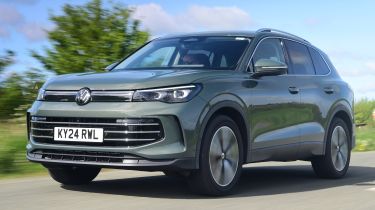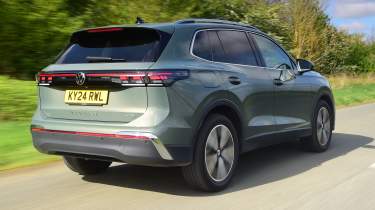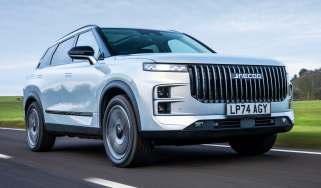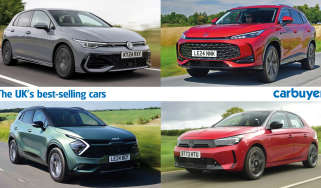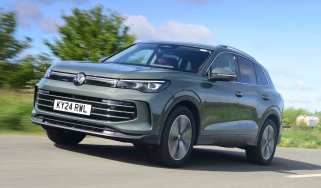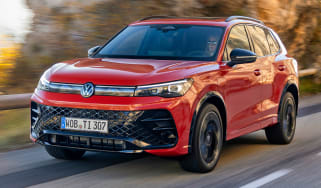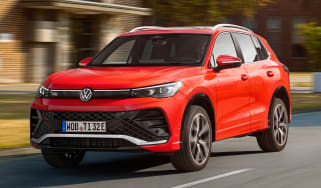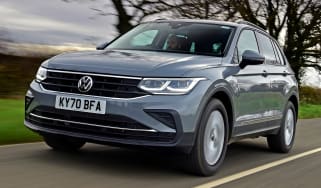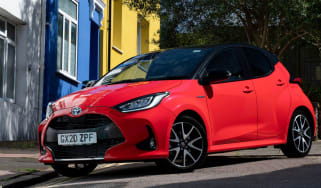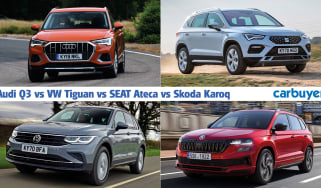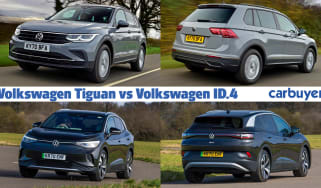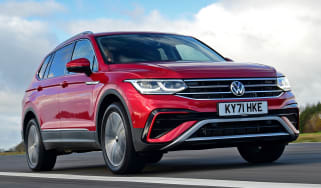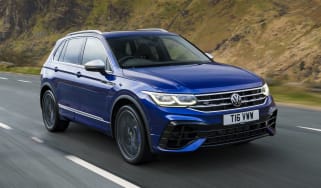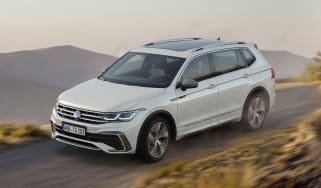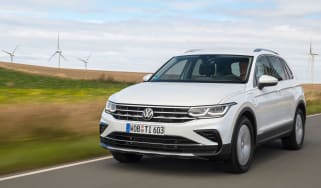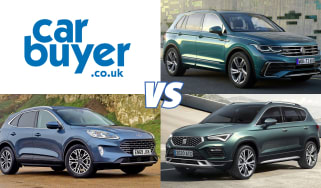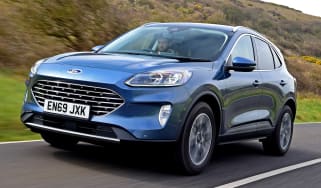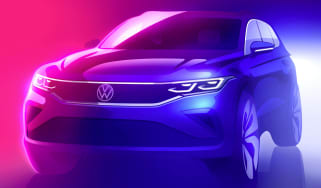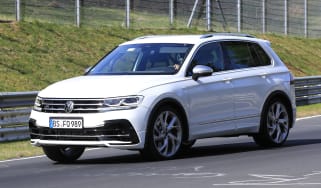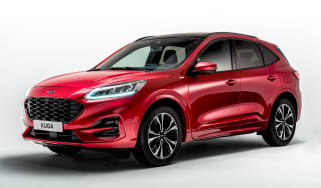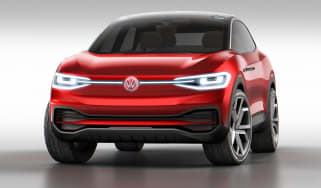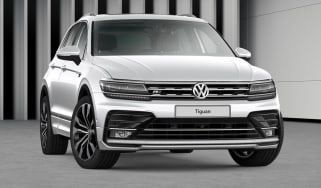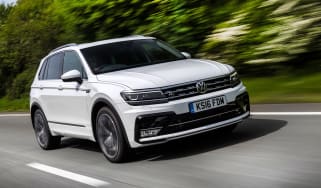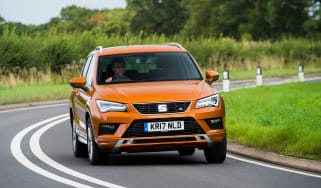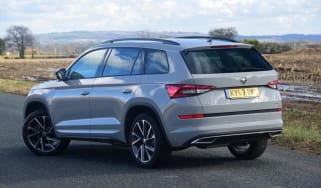Volkswagen Tiguan review – family SUV with a trusted formula
"Volkswagen has stuck to what it knows for the latest Tiguan, building on the old model with improved practicality"
Pros
- Refined engines
- Improved interior
- Big boot
Cons
- Too many touch-sensitive controls
- Expensive
- Quality dependent on trim level
Verdict – is the Volkswagen Tiguan a good car?
The Volkswagen Tiguan is a popular mid-size SUV that’s now in its third generation. Such is the Tiguan's importance, the German brand hasn’t wanted to rock the boat too much and its design is as conservative as always. It does look a bit more like its electric ID siblings, though, and there’s now even more space inside with a hugely practical boot to the rear. The interior has seen a bigger rethink, with bigger screens and fewer buttons, while the engine line-up sticks with petrol, diesel and two plug-in hybrid options. Its price has crept up this time around, so the Tiguan now faces competition from upmarket brands in addition to the many mainstream rivals.
Volkswagen Tiguan models, specs and alternatives
Volkswagen has a seemingly endless range of SUVs now, and sitting between the T-Roc and the upcoming Tayron is the mid-size Tiguan. The latest Tiguan will probably be the last powered by petrol and diesel as Volkswagen has confirmed the name will live on in the future as an EV.
The latest Tiguan takes design cues from the brand’s electric ID models, with the front headlights joined by a thin black strip of trim that gets a full-width light bar on higher-spec models. There’s less of an emphasis here on a grille, so you wouldn’t be blamed for expecting it to be an EV.
More reviews
From launch, Volkswagen kept the Tiguan fairly conventional under the skin, with a 1.5-litre mild-hybrid petrol engine with either 128bhp or 148bhp, and a sole 148bhp 2.0-litre diesel engine. In 2024, Volkswagen also announced the arrival of a 2.0-litre engine that produces 261bhp and is reserved for the R-Line model.
Another addition to the range are two plug-in hybrids using a 1.5-litre TSI engine and motor, badged eHybrid with either 201bhp or 268bhp. They boast an electric range of up to 77 miles which contributes to a 707mpg on-paper fuel economy figure for the 201bhp version, while this is 673mg for the 268bhp model. Both get low CO2 emissions of between just 9-10g/km. As with all PHEVs, make sure you take those figures with a pinch of salt, as you’ll have to keep the Tiguan eHybrid regularly charged up if you’re to have any chance of achieving them.
There’s no full EV version of the Tiguan, with the electric alternative covered off by the similarly-sized Volkswagen ID.4 and ID.5.
On the inside, the Tiguan’s interior is heavily based on that of the Volkswagen Passat. Unfortunately, although Volkswagen has very recently started to reintroduce more physical controls to address criticisms of fiddly touch-sensitive buttons used in its cars, the latest Tiguan has just missed out on this improvement. Many of its controls are touch-sensitive as a result, although they are now backlit (a criticism of those in the pre-facelift Mk8 Volkswagen Golf) and those used on the steering wheel are more conventional and easier to use.
As a general rule, the Tiguan feels well built, though the entry-level version (badged simply ‘Tiguan’) feels a bit dreary on the inside. At the time of writing, the Tiguan comes in five trim levels, and we much preferred the interior of our Elegance test model, which sits one step below the top R-Line trim, getting niceties such as chrome and leather trim, plus three-zone climate control, heated and massaging front seats, adaptive cruise control and a 360-degree camera, though it does cost around £5,000 more than the base model.
The Volkswagen Tiguan is now larger and more practical than before. As a result the rear seats feel big enough for tall adults and the entire cabin feels roomy overall with good visibility. There’s a big boot that’s 37 litres larger than that of the old car, and beats the boots of rivals such as the Ford Kuga, Renault Austral and Toyota RAV4.
Safety is top-notch in the latest Volkswagen Tiguan, and buyers will be happy to hear that it achieved the full five stars when it was crash-tested by Euro NCAP. Not so impressive is Volkswagen’s owner satisfaction, as the brand came in a disappointing 29th place out of 32 manufacturers in our 2024 Driver Power survey.
| Trim levels | Power options |
|
|
MPG, running costs & CO2 emissions
The Volkswagen Tiguan was rather traditional when it came to its engines, launching with two petrol 1.5-litre units and a 2.0-litre diesel, but these have since been joined by a plug-in hybrid model. The conventional engines’ efficiency is middling, with mid-40s mpg for the petrol engines and just over 50mpg for the diesel, which aren’t terrible numbers, but won’t set the world on fire either. The eHybrid PHEV is much more impressive, with a long electric range and low CO2 emissions making it great as a company car. Read more about the Volkswagen Tiguan’s MPG, running costs & CO2 emissions…
Engines, drive & performance
Like most mid-sized SUVs, the Tiguan is designed to be easy to drive and comfortable first and foremost. Its handling sits near the middle of the class, so it’s not quite as sharp as a BMW X1 or Ford Kuga, but the Tiguan is also a bit more enjoyable than the Nissan Qashqai from behind the wheel. It’s composed and secure, while its petrol and diesel engines pull reasonably strongly from low speeds. Every version comes with an automatic transmission offering quick changes, but a slightly jerky feel when parking. Read more about the Volkswagen Tiguan’s engines, drive & performance…
Interior & comfort
After a bit of a blip, Volkswagen’s interior quality has shown improvement for recent models, but not everyone will love the move towards big screens and touch-sensitive controls. We also found the Tiguan varies a lot depending on the trim level, with the entry-level trim feeling basic next to some rivals. Match is the best pick, with quite a bit of extra kit for not too much extra outlay. Read more about the Volkswagen Tiguan’s interior & comfort…
Boot space, practicality & dimensions
Thanks to a growth spurt for its latest generation, the Tiguan is now one of the biggest cars in its class, so there’s generous amounts of space for front and rear passengers. The Volkswagen Tiguan has a 652 litre boot – 37 litres bigger than before, and more than the Ford Kuga and Toyota RAV4. Read more about the Volkswagen Tiguan’s boot space, practicality & dimensions…
Reliability & safety
It will be a while before we can assess the reliability of the latest Tiguan, but the outgoing model came 45th out of the top 50 models in our Driver Power survey, with a 38th position for reliability. Its overall score puts it well behind the likes of the Toyota RAV4 (fourth), Citroen C4 Aircross (ninth) and Skoda Karoq (15th). It comes fitted with VW’s latest safety kit, and achieved five stars when tested by Euro NCAP. Read more about the Volkswagen Tiguan’s reliability & safety…
Volkswagen Tiguan alternatives
Rivals to the Volkswagen Tiguan include mid-size SUVs which serve as the logical next step up in terms of practicality and size from family hatchbacks such as the Volkswagen Golf. The Tiguan’s price puts it in slightly more upmarket territory than many family SUVs, though there are also some premium SUVs with similar dimensions around the same price.
Mid-size family SUVs
There are lots of mainstream mid-size family SUVs on the market these days, so the Tiguan has a long list of rivals in this area. One of the UK’s best-selling cars, the Nissan Qashqai, is one such model, though rivals such as the Peugeot 3008 offer a little more style. The Tiguan’s appeal is in its sturdy build quality and well-known badge, though its Skoda Karoq sister car offers much of the same kit at a more affordable price.
Premium SUVs
The Volkswagen Tiguan’s price positions it as a slightly more upmarket option in comparison to other mainstream models, putting it on par with premium SUVs such as the Audi Q3 or BMW X1, which are similar in size, too. That means the Tiguan feels overly expensive when you consider what else you can have on that budget.
Should you buy a Volkswagen Tiguan?
The Volkswagen Tiguan is a best-seller globally, but in all honesty, there’s much better value for money if you shop around, because the Tiguan’s high asking price starts to put it up against premium options without the clout of a particularly premium badge. It’s very practical, though, having increased in size compared to the last model, and it offers better build quality than some of Volkswagen’s more recent models.
What is the Carbuyer pick of the Volkswagen Tiguan range?
If we were picking a Tiguan, we’d go for one of the Life or Match models given the extra tech they offer for the price, but we'd avoid the rather dull-looking entry-level trim. If we were going to cover lots of motorway miles the 2.0-litre diesel engine would be our choice, but for a mix of town and motorway driving we’d stick to one of the 1.5-litre mild-hybrid petrol versions.
How we tested the Volkswagen Tiguan
We’ve driven the Volkswagen Tiguan with the 2.0-litre diesel TDI engine in France in Elegance trim. The roads were fairly smooth where we drove it, but we've now also put the Tiguan head-to-head with a BYD Seal U on British roads.
Visit our sister site Auto Express for an alternative view on the VW Tiguan ...
